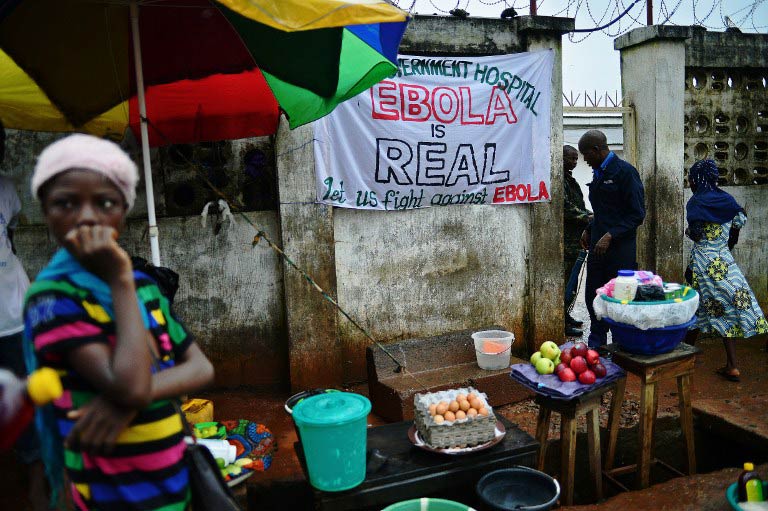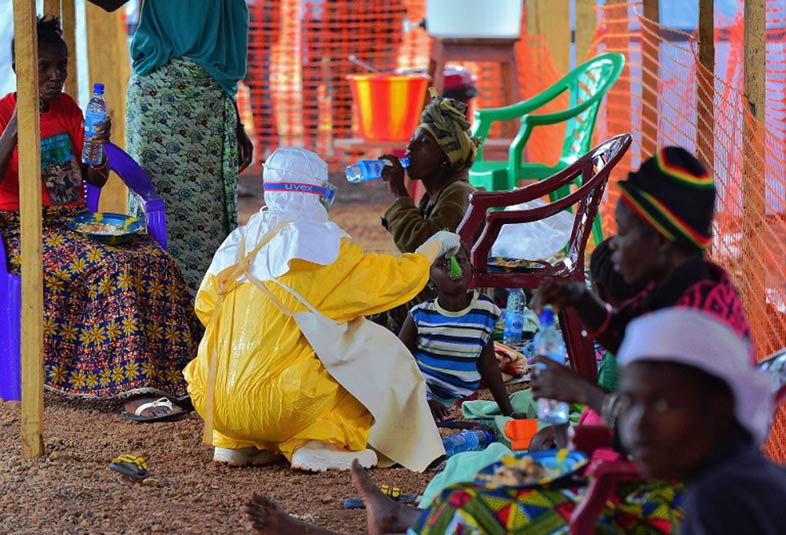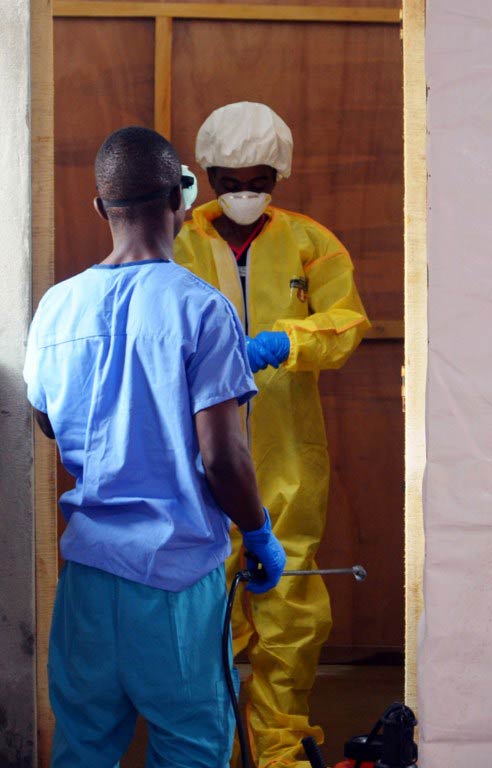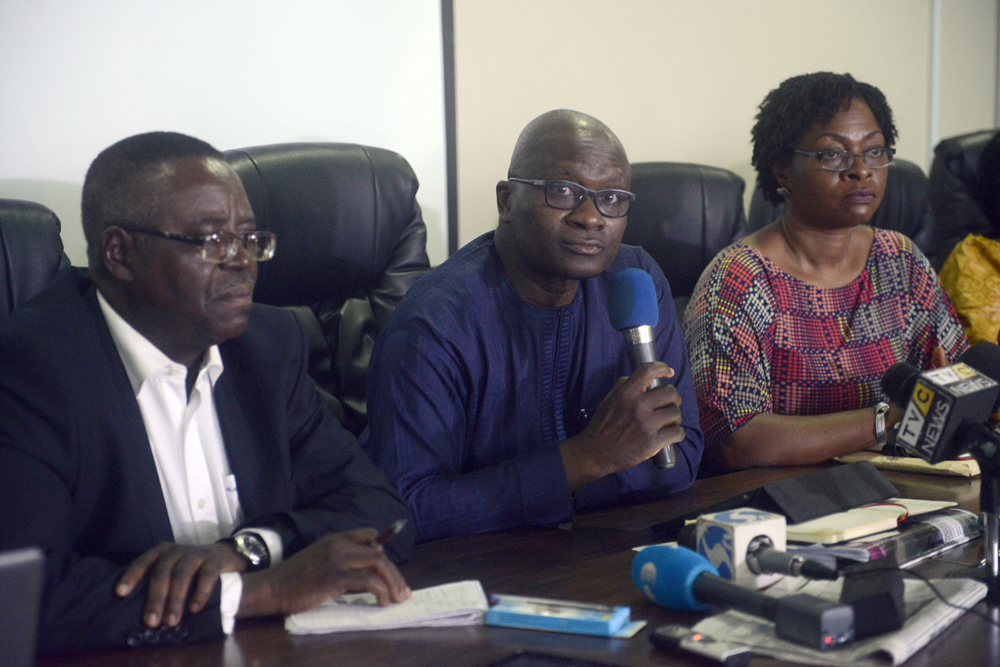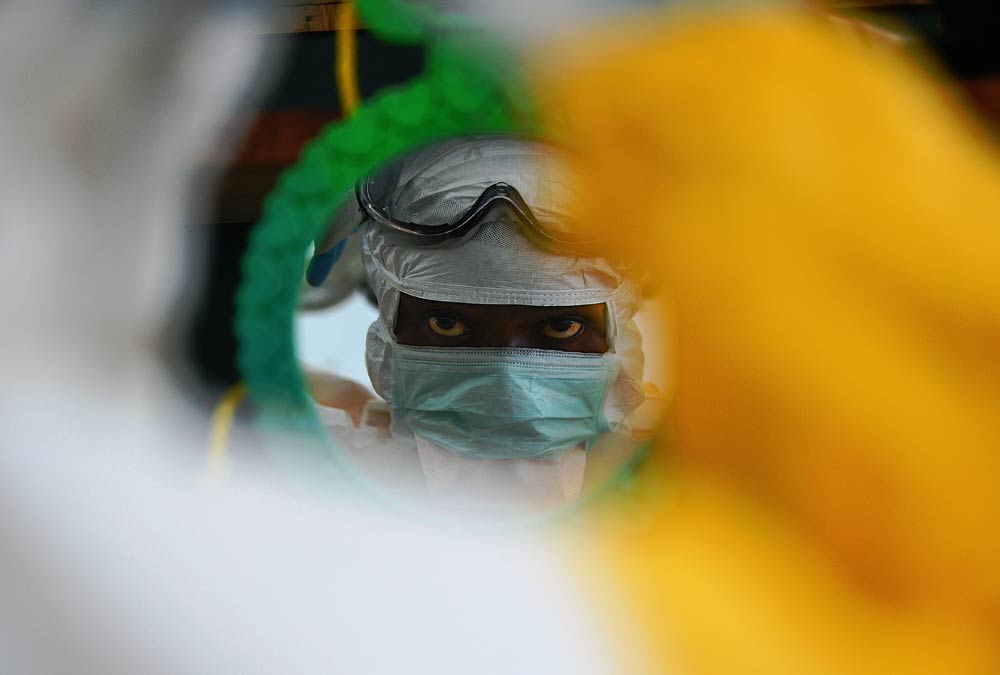
A Cameroonian friend shares a conversation between two of his fellow nationals in an airport. One of them remarks that he is not feeling too well. The immediate, and hysterical, reaction of the other is that he must have Ebola.
“Maybe you’ve been infected with Ebola from those Lagos passengers at the arrival hall,” my friends recounts one of them saying.
On Twitter, a Kenyan user notes that passengers on flights from Entebbe to Nairobi are not being screened for Ebola. The checks are inconsistent, he notes, meaning the disease can be brought in to the nation via Uganda.
Last week, a hoax did the rounds on Whatsapp as Zimbabweans shared a Photoshopped version of a local newspaper with a headline claiming that the country had confirmed its first Ebola patients.
With news that the DRC has reported its first two cases of Ebola, fear and panic is set to deepen if the virus continues to spread outside of west Africa. A meme doing the rounds on social media shows a surge of people running in all directions from a central location with a caption to the effect, “When Pastor says someone in the congregation has Ebola and he’s going to heal them.”
It may all seem a joke, especially for Africans who are geographically distanced from the epidemic’s epicentre, but a scenario as posited in that meme is probably not far from becoming a reality. With inadequate health response mechanisms bedevilling many parts of the continent, death from Ebola remains a real threat.
But as West African nations seal their borders to protect their nationals, as international airlines abandon routes that ply nations worst affected by the epidemic, and as western nations claim and evacuate their citizens affected by the disease, a larger problem beyond the virality of Ebola – both physical and mediated – is festering.
Over the last few years, meticulous work has gone into crafting the ‘Africa Rising’ narrative; a narrative founded upon the continent’s rising economies (like South Africa and Nigeria), the emergence of tech and innovation (think Kenya) and the growth of a middle class that we might call ‘post-African’; savvy, urban, cosmopolitan with no flies to swat off their faces and no begging bowls in their manicured hands.
In a May editorial, David Brooks of the New York Times wrote about ‘The Real Africa’ wherein he cited various economic measures – trade and mobile phone growth among others – to show why Africa has become “the test case of 21st-century modernity”.
The challenge I have always had with this narrative is that while the statistics do point to a truth, another truth, a truth of lack, still prevails.
Across the different parts of Africa I have had the privilege to visit in the west, east and south of this continent, I have seen the consumerist dream (high-end malls, cars, mansions and general financial exuberance) coexist with abjection, poverty and depleted social services. The rich do exist, but they are not the majority.
In many ways, the spread of Ebola shows up this suitable Africa Rising narrative. It shows hysteria, fear and othering, things which many Africans in poverty already have to live with daily, away from the narratives of luxury. Quite instantly, Ebola has become ‘the great leveller’ among Africans, reperpetuating stereotypes of barbarism and savagery; that Africans eat ‘strange foods’ like fruit bats and bush meat and other ‘filthy creatures’, that we are unclean, diseased and therefore dangerous.
A photograph taken from the window of a bar in Seoul, South Korea, aptly shows how collective and inclusive this othering has become. “We apologize, but due To Ebola virus, we are not accepting Africans at the moment,” the notice reads. The Daily Beast reports that in Italy, some schools have warned that pupils of African origin will require additional health certification before returning to school; something which has not been deemed necessary for white pupils who may have travelled to Africa over the summer vacation.
In palpable ways, Ebola has opened up way for the ‘dark continent’ narrative to re-emerge, if it ever really disappeared. And in its inclusivity, Africa is collapsed into one territory, one country, one race, even if the fatality of Ebola represents about 0.15% of the continent. Through these short-cut understandings emerges a dominant global hysteria that lends itself to racial profiling and generalisations that make me wonder just how far, if at all, the discourse around blackness has progressed.
But the converse of this argument shows us, as Africans, being complicit in this typecasting in many ways. Ebola is serving to deepen regionalism (west Africa versus the rest of Africa) and the dangerous sort of nationalism that has often led to ineffectual collaboration across the continent; a superiority complex we tend to develop when we buy too deeply into the Africa rising ideology. Therefore, it is a ‘them’ that is diseased, a ‘them’ that must be avoided at all costs. And the great irony of it all is that a few months ago, the continent banded together to support African teams at the World Cup, the majority of them from the region that has since been affected most deeply by Ebola.
As we rail against news channels like CNN getting the geographical locations of Niger and Nigeria wrong, let us not forget the challenges we face beyond the semantics, which I agree are essential to get correct. If Africa – given its wealth of human and natural resources – cannot contain Ebola, then we must sober up and accept that we haven’t risen to where we should be, given the accompanying discourse of booming economies and commodity markets.
The truth, for me, is somewhere between the dichotomies (“rising” and “darkness”) that have been constructed for easy navigation of, and interaction with, Africa. The continent has great promise and developments, but it also has many challenges to overcome. For how do we term it rising if we must constantly fall to our feet in failure to respond to our own problems?
Fungai Machirori is a blogger, editor, poet and researcher. She runs Zimbabwe’s first web-based platform for women, Her Zimbabwe, and is an advocate for using social media for consciousness-building among Zimbabweans. Connect with her on Twitter.

